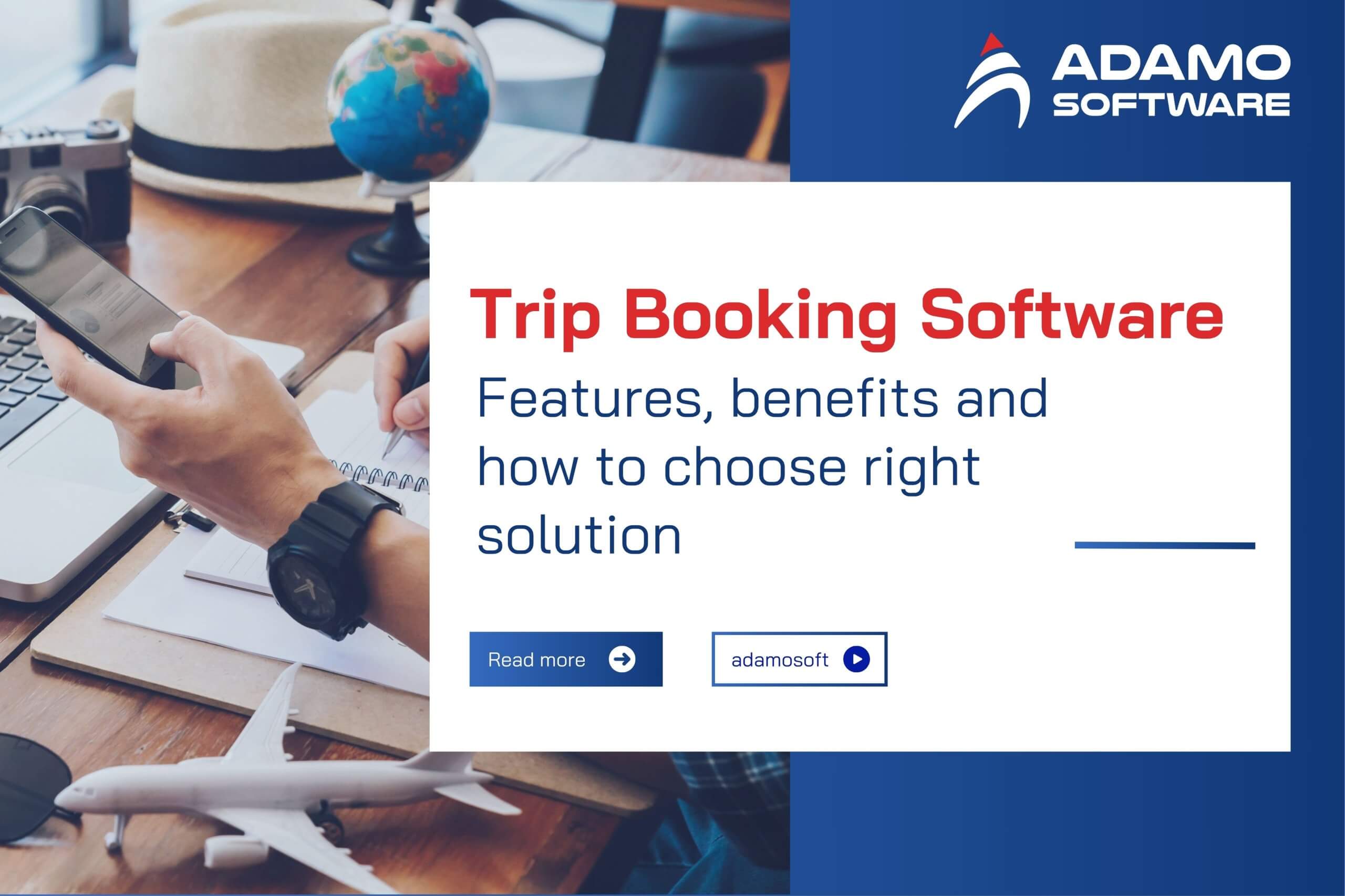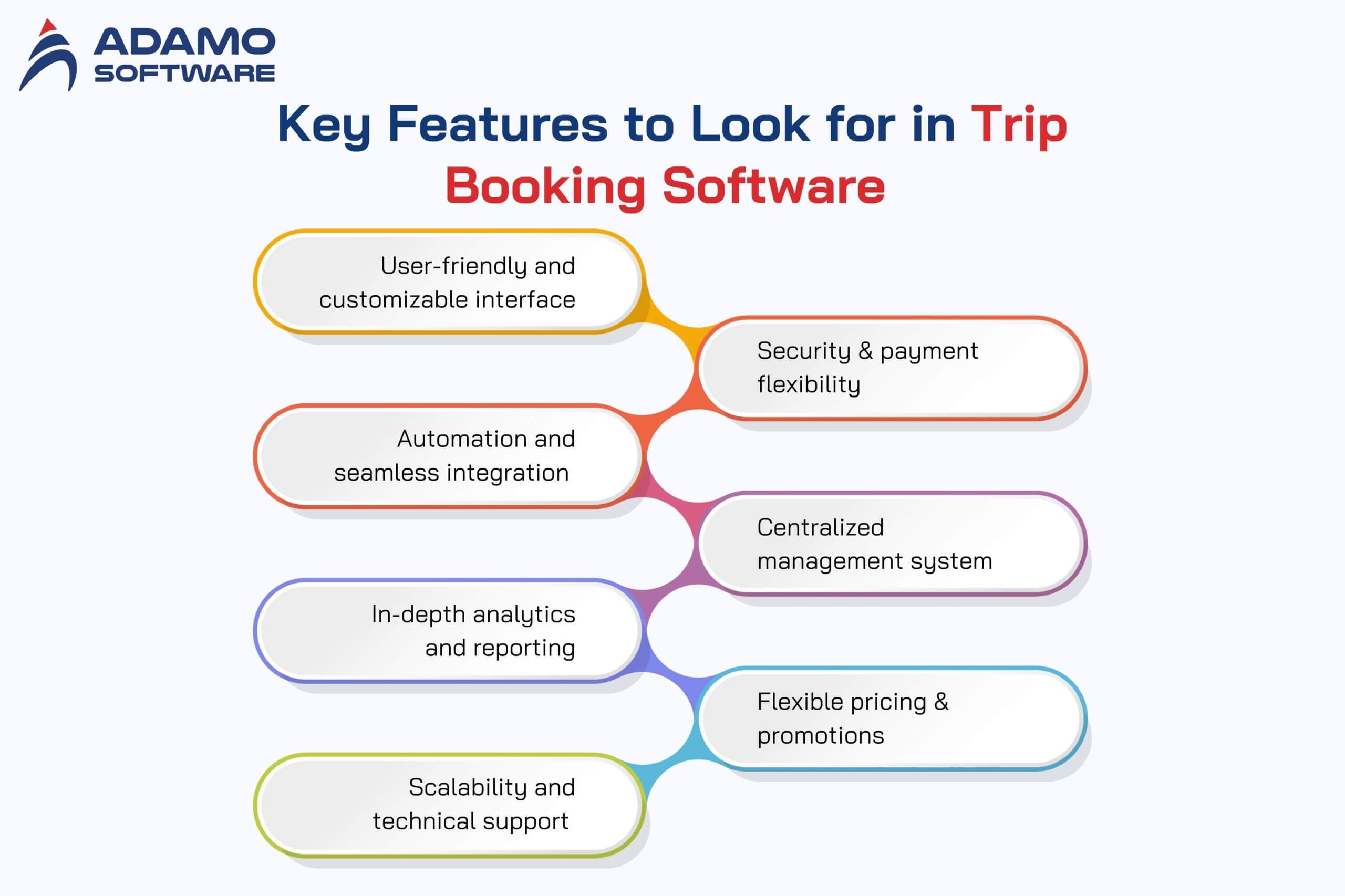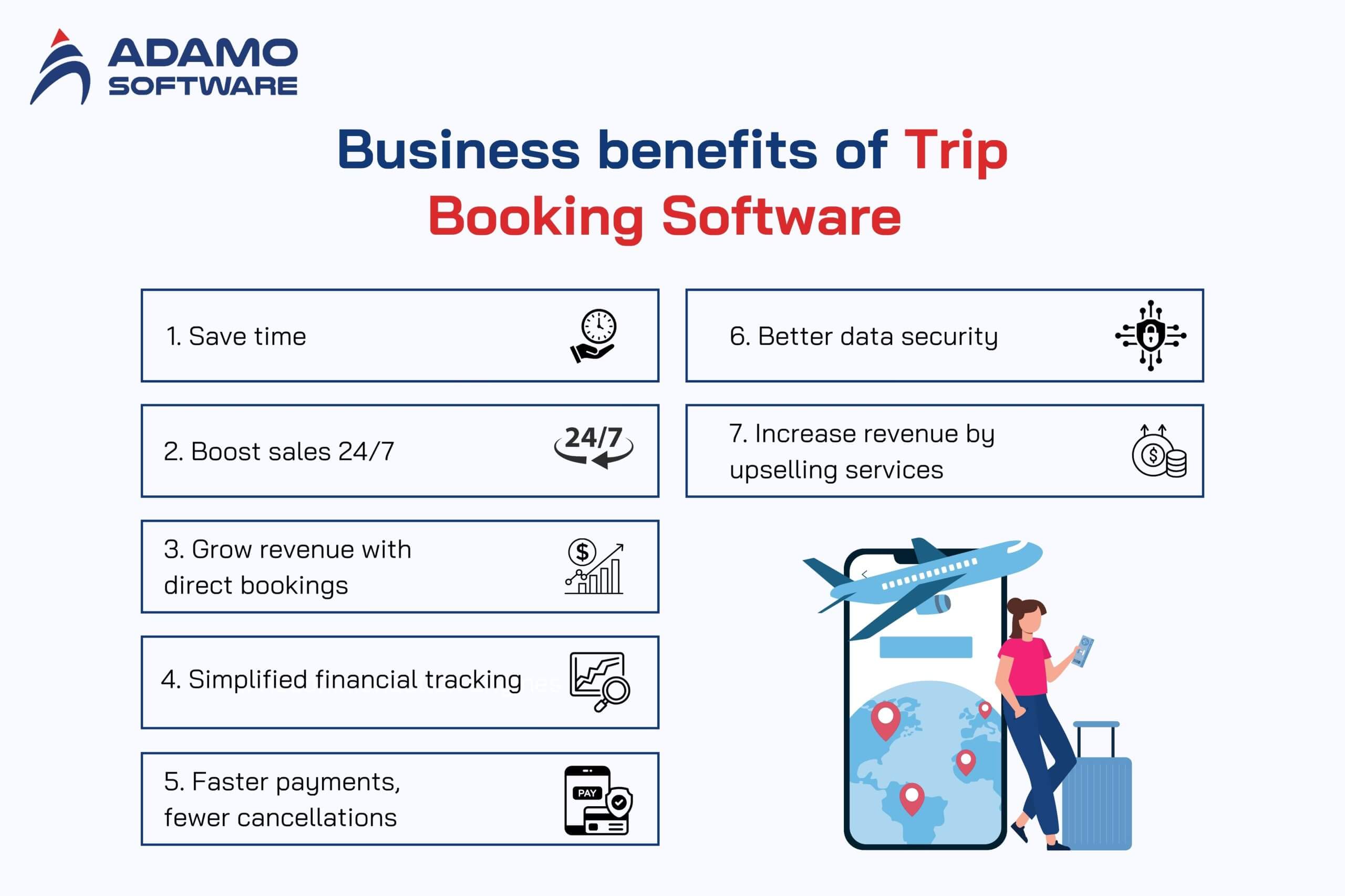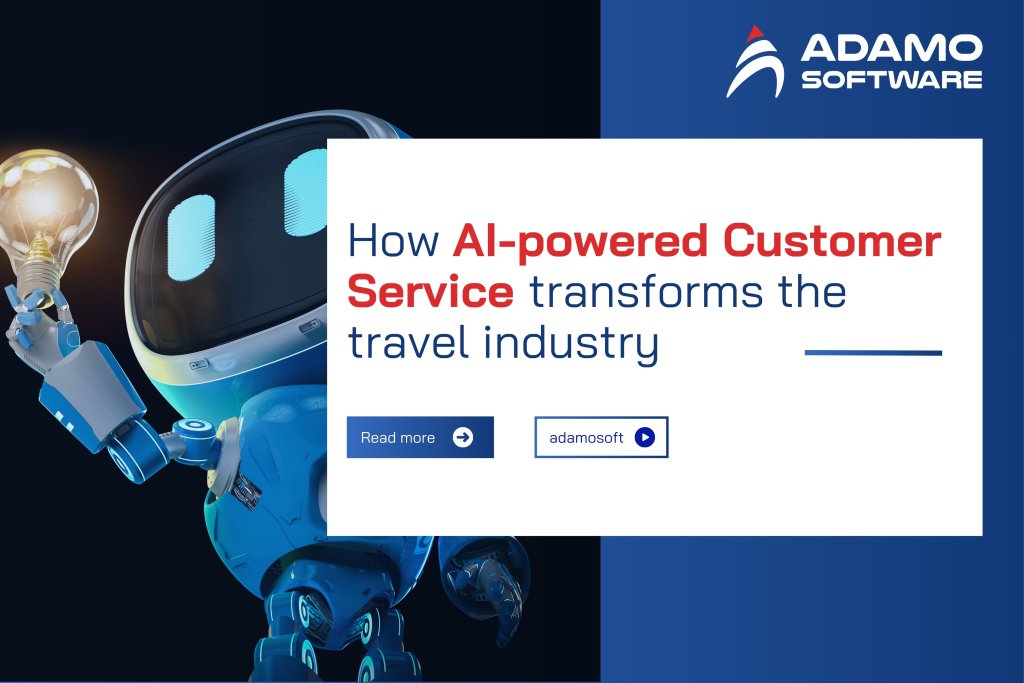Trip Booking Software: Features, benefits and how to choose right solution

Discover top features of trip booking software and how it boosts sales, automation, and customer experience for travel businesses in 2025.
I. What is Trip Booking Software?
Trip booking software is a digital solution that allows travel companies to manage bookings, payments, and availability in one place—while offering customers a seamless online booking experience.
It also streamlines back-office operations—helping operators manage tour schedules, guide assignments, customer lists, inventory, and financial tracking with ease.
You can also explore about overview of Trip Planner App: Must-Have Features, Costs & Development Guide here.
II. Key Features to Look for in Trip Booking Software
How do you choose the right trip booking software for your travel business? First, you need to understand what features make a difference. A good platform will handle bookings and automate processes, enhance customer experience, and help you scale without any hassle.
Here are 7 essential features every travel business should look for when building a trip booking software:

User-friendly and customizable interface
Travel booking software that is easy to use will help both employees and customers operate quickly without taking much time to get used to it. If the interface is clear and intuitive, you will save hours of training and avoid unnecessary errors during the operation.
In addition, you should be able to customize the software to match your brand identity — from logo colors to booking flow. This creates a consistent user experience and increases trust.
A simple, customizable interface improves operational efficiency and enhances the customer experience. Customers will easily complete their tour booking, increasing conversion rates and building long-term loyalty.
Automation and seamless integration
Automation tools help you quickly handle repetitive daily tasks, such as sending confirmation emails, updating tour status, reminding payment, or managing inventory. When everything is automated, you save a lot of time and manual effort.
Your travel booking software should also be compatible with your existing systems, such as your CRM, accounting, or email marketing platform. API integration will help all data be synchronized quickly without interrupting operations.
Automation reduces errors and allows your team to focus on the customer experience. Meanwhile, seamless integration ensures systems run smoothly and saves time on implementation.
In-depth analytics and reporting
An effective tour booking system should provide complete and accurate reports on user behavior, tour sales performance, and booking volume over time. This data is helpful for planning, optimizing prices, or allocating resources appropriately.
In addition, detailed reports help you understand your customers better and personalize your service, such as offering suitable offers and suggesting itineraries or tour packages for each audience.
Data-driven decisions help businesses respond quickly to market trends. You will reach customers at the right time, with the right needs, and optimize the effectiveness of marketing campaigns.
Scalability and technical support
No matter what stage your business is in, good trip-booking software must be scalable. When you increase the number of tours, expand the market, or serve more customers, the system still needs to operate stably.
At the same time, make sure that the software provider has a team of quick technical support, especially during sensitive times such as peak season or initial deployment.
An easily scalable platform will accompany your business in the long term. And when problems occur, timely support helps you maintain smooth operations without affecting the customer experience.
Ready to Outsource?
Discover how we can transform your business with expert IT solutions.
Security & payment flexibility
Ensuring security is a must with any tour booking software. According to international standards, customer information and payment data should be encrypted and stored securely.
In addition, the system should support multiple payment methods such as credit cards, bank transfers, e-wallets, or local payment gateways. This helps customers increase flexibility during the payment process.
Security helps build trust, while convenient payment increases the rate of tour booking completion. Both of these factors contribute directly to your revenue and brand reputation.
Centralized management system
You should not have to open multiple tabs or manually record to track customers, schedules, available seats, or payment status. Modern tour booking software should allow you to manage everything in one place.
With a centralized system, you can quickly check booking status, edit tour information, view reports, update customer data, and plan more easily.
Consistency in management helps reduce errors, avoid overbooking, and save your team significant operating time.
Flexible pricing & promotions
Prices in the tourism industry constantly change according to season, demand, and market conditions. Good trip booking software should help you adjust prices flexibly according to time, region, or customer target.
You should also easily create and manage promotions, discount codes, or combo packages to boost sales during off-peak times.
Flexible pricing helps optimize profits, while promotions help keep customers stable. Combining both strategies will help businesses adapt quickly and sustainably.
III. Business Benefits of Trip Booking Software
Many businesses in the travel industry still process bookings in the traditional way – handwritten notes, phone calls, or Excel updates. Although familiar, this method is prone to errors, time-consuming, and difficult to scale when customers increase.
In the context of users increasingly preferring fast, compact, transparent experiences, switching to travel booking software is necessary if you want to operate effectively and grow sustainably.
Here are the benefits the software brings to travel companies of any size.

1. Save time
No more staff have to be on the phone all day to explain schedules, check availability, or confirm bookings.
Tour booking software automatically helps customers choose their schedules, book, pay, and receive confirmation emails.
This frees your team to focus on more valuable tasks like customer service or product development.
2. Boost sales 24/7
Manual booking systems only work during business hours. Outside those hours, you may miss out on customers ready to spend money.
In contrast, travel booking software keeps your website running 24/7 – customers can book tours anytime, even at night or on holidays.
Businesses are no longer limited by time zones or phone schedules.
3. Grow revenue with direct bookings
You often have to pay commissions or platform fees when selling tours through OTAs (online travel agencies).
Integrated tour booking software on your website helps you sell directly to customers, keep all revenue, and have complete control over customer data.
From there, you can build a loyal customer base, analyze booking behavior, and deploy more effective marketing campaigns.
Ready to Outsource?
Get top-tier IT talent without the hassle. Contact us now!
4. Simplified financial tracking
Some software supports accounting features such as debt tracking, payment management, agent commission calculation, and revenue reporting.
Instead of making manual reports, you can monitor the business situation in real-time and know which tours are selling well and which costs are increasing.
5. Faster payments, fewer cancellations
Requiring customers to pay in advance through the software helps ensure a stable cash flow and limits last-minute cancellations.
Integrated payment gateways help customers pay easily without requiring manual transfers or phone calls to confirm.
Higher conversion rates, fewer lost seats, and easier to predict for tour operations.
6. Better data security
As digital bookings rise, travelers are becoming more cautious about how their personal and payment information is collected and stored.
Modern travel booking software typically adheres to security standards like data encryption, access control, and secure cloud storage.
Protecting your guests’ data is also a way to build long-term trust with them.
7. Increase revenue by upselling services
An underappreciated benefit: the software allows you to upsell additional services like airport transfers, travel insurance, or sightseeing tickets.
When suggested at the right time – right during the booking process – guests are willing to spend more to upgrade their experience.
This helps you increase the value of your orders without increasing your marketing costs.
IV. Industry trends and prospects for travel booking software
1. Business Travel is Back in the Air
After the pandemic, travel demand has not only recovered but has grown exponentially. According to a Global Business Travel Association (GBTA) report, global spending on business travel is expected to reach $1.48 trillion by 2024—surpassing pre-2020 levels.
With this boom, travel booking software must be scalable and flexible, supporting various services such as tours, accommodations, and transportation.
2. AI is Reshaping Travel Behavior
Customers are increasingly demanding more personalized experiences. A survey from TravelPerk found that 98% of industry leaders believe AI will significantly impact the travel industry in the coming years.
Modern tour booking software uses AI to adjust prices automatically, suggests additional services, and supports customers via chatbots—helping businesses save significant operating costs.
3. Mobile dominates booking behavior
StatCounter data reveals that mobile devices now account for close to 60% of all global website traffic, highlighting how essential it is to optimize for mobile users. This indicates that customers are increasingly inclined to book tours directly on their phones.
If your booking software is not optimized for mobile, you risk losing customers to competitors due to poor user experience.
4. Multichannel sales is key
Travel businesses now rely on direct sales channels and distribute products through OTAs such as Viator, Expedia, and local agents. According to Skift, the multi-platform cooperation model is helping many tour providers grow revenue rapidly. Predicts that by 2030, direct online bookings will overtake OTAs, reaching $409 billion compared to $333 billion from OTAs
Trip booking software must support API connectivity and real-time inventory updates to ensure data synchronization and avoid duplicate bookings.
V. Final thoughts: What makes Adamo different?
At Adamo Software, we don’t just provide trip booking software — we work with you to build the right technology solutions for sustainable growth in the rapidly changing travel industry.

With 200+ Travel & Hospitality software development projects delivered, Adamo builds booking platforms that are flexible, scalable, and tailored to how real travel businesses work. From API integrations (like Skyscanner or Booking.com) to clean, mobile-first dashboards—we help you simplify operations and grow smarter.
Let’s build a future-ready travel platform together. Contact Adamo and turn your booking process into your growth engine.





